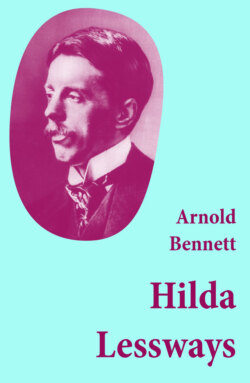Читать книгу Hilda Lessways (Unabridged) - Arnold Bennett - Страница 7
На сайте Литреса книга снята с продажи.
iii
ОглавлениеMr. Skellorn did not come; he was most definitely late.
From the window of her bedroom, at the front of the house, Hilda looked westwards up toward the slopes of Chatterley Wood, where as a child she used to go with other children to pick the sparse bluebells that thrived on smoke. The bailiwick of Turnhill lay behind her; and all the murky district of the Five Towns, of which Turnhill is the northern outpost, lay to the south. At the foot of Chatterley Wood the canal wound in large curves on its way towards the undefiled plains of Cheshire and the sea. On the canal-side, exactly opposite to Hilda’s window, was a flour-mill, that sometimes made nearly as much smoke as the kilns and chimneys closing the prospect on either hand. From the flour-mill a bricked path, which separated a considerable row of new cottages from their appurtenant gardens, led straight into Lessways Street, in front of Mrs. Lessways’ house. By this path Mr. Skellorn should have arrived, for he inhabited the farthest of the cottages.
Hilda held Mr. Skellorn in disdain, as she held the row of cottages in disdain. It seemed to her that Mr. Skellorn and the cottages mysteriously resembled each other in their primness, their smugness, their detestable self-complacency. Yet those cottages, perhaps thirty in all, had stood for a great deal until Hilda, glancing at them, shattered them with her scorn. The row was called Freehold Villas: a consciously proud name in a district where much of the land was copyhold and could only change owners subject to the payment of ‘fines’ and to the feudal consent of a ‘court’ presided over by the agent of a lord of the manor. Most of the dwellings were owned by their occupiers, who, each an absolute monarch of the soil, niggled in his sooty garden of an evening amid the flutter of drying shirts and towels. Freehold Villas symbolized the final triumph of Victorian economics, the apotheosis of the prudent and industrious artisan. It corresponded with a Building Society Secretary’s dream of paradise. And indeed it was a very real achievement. Nevertheless Hilda’s irrational contempt would not admit this. She saw in Freehold Villas nothing but narrowness (what long narrow strips of gardens, and what narrow homes all flattened together!), and uniformity, and brickiness, and polished brassiness, and righteousness, and an eternal laundry.
From the upper floor of her own home she gazed destructively down upon all that, and into the chill, crimson eye of the descending sun. Her own home was not ideal, but it was better than all that. It was one of the two middle houses of a detached terrace of four houses built by her grandfather Lessways, the teapot manufacturer; it was the chief of the four, obviously the habitation of the proprietor of the terrace. One of the corner houses comprised a grocer’s shop, and this house had been robbed of its just proportion of garden so that the seigneurial garden-plot might be triflingly larger than the others. The terrace was not a terrace of cottages, but of houses rated at from twenty-six to thirty-six pounds a year; beyond the means of artisans and petty insurance agents and rent-collectors. And further, it was well built, generously built; and its architecture, though debased, showed some faint traces of Georgian amenity. It was admittedly the best row of houses in that newly settled quarter of the town. In coming to it out of Freehold Villas Mr. Skellorn obviously came to something superior, wider, more liberal.
Suddenly Hilda heard her mother’s voice, in a rather startled conversational tone, and then another woman speaking; then the voices died away. Mrs. Lessways had evidently opened the back door to somebody, and taken her at once into the sitting-room. The occurrence was unusual. Hilda went softly out on to the landing and listened, but she could catch nothing more than a faint, irregular murmur. Scarcely had she stationed herself on the landing when her mother burst out of the sitting-room, and called loudly:
“Hilda!” And again in an instant, very impatiently and excitedly, long before Hilda could possibly have appeared in response, had she been in her bedroom, as her mother supposed her to be: “Hilda!”
Hilda could see without being seen. Mrs. Lessways’ thin, wrinkled face, bordered by her untidy but still black and glossy hair, was upturned from below in an expression of tragic fretfulness. It was the uncontrolled face, shamelessly expressive, of one who thinks himself unwatched. Hilda moved silently to descend, and then demanded in a low tone whose harsh self-possession was a reproof to that volatile creature, her mother:
“What’s the matter?”
Mrs. Lessways gave a surprised “Oh!” and like a flash her features changed in the attempt to appear calm and collected.
“I was just coming downstairs,” said Hilda. And to herself: “She’s always trying to pretend I’m nobody, but when the least thing happens out of the way, she runs to me for all the world like a child.” And as Mrs. Lessways offered no reply, but simply stood at the foot of the stairs, she asked again: “What is it?”
“Well,” said her mother lamentably. “It’s Mr. Skellorn. Here’s Mrs. Grant—”
“Who’s Mrs. Grant?” Hilda inquired, with a touch of scorn, although she knew perfectly well that Mr. Skellorn had a married daughter of that name.
“Hsh! Hsh!” Mrs. Lessways protested, indicating the open door of the sitting-room. “You know Mrs. Grant! It seems Mr. Skellorn has had a paralytic stroke. Isn’t it terrible?”
Hilda continued smoothly to descend the stairs, and followed her mother into the sitting-room.
